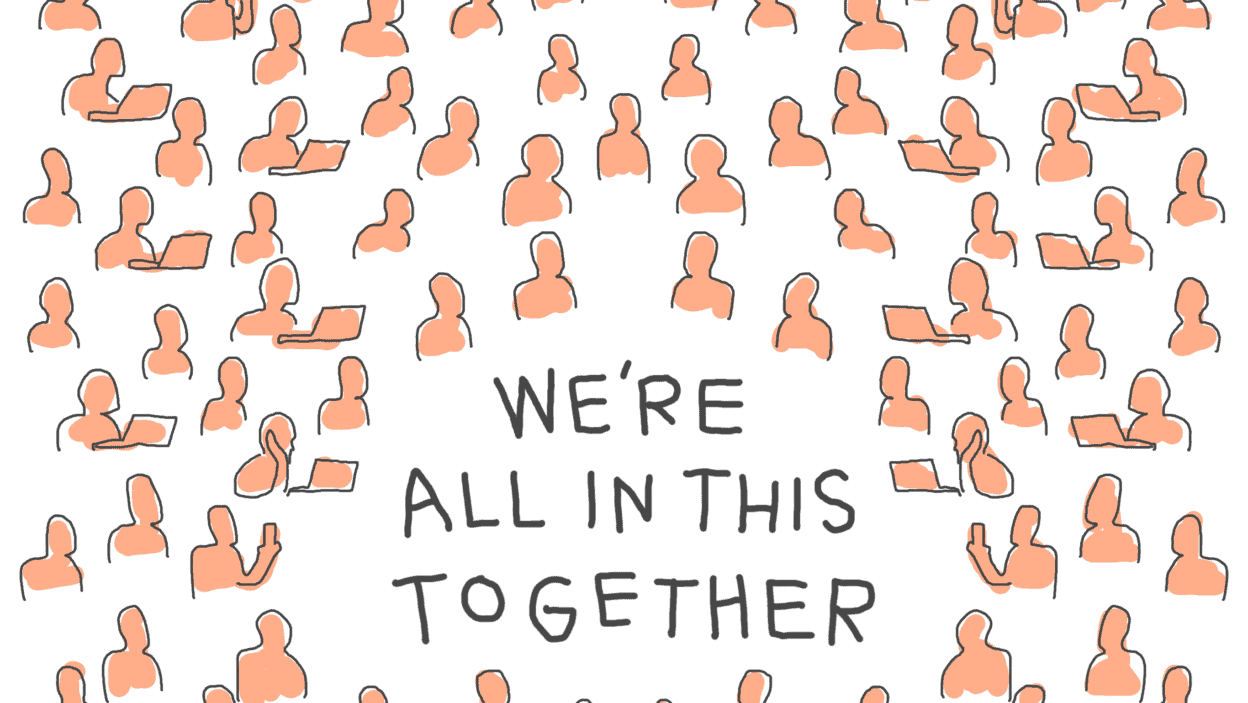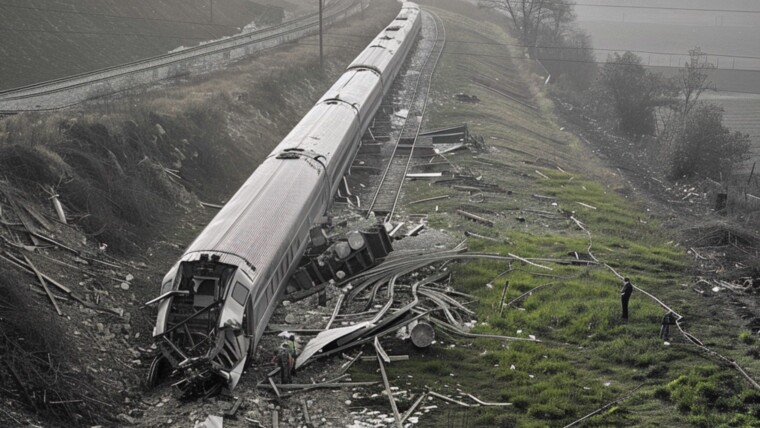Why We Gathered
In mid-March, when we heard rumors that folks would be transitioning to work from home and that conferences across the world were being canceled, we at NOBL decided to launch our own daylong, virtual conference to address the alarming impacts of COVID-19 on businesses and leaders. In only nine business days, our team planned and executed Change@Work, a virtual conference featuring more than thirty sessions on the urgently changing nature of work. Over four thousand attendees participated in three tracks: leading in uncertainty, remote work, and resilience. We’ve collected all the videos from the event below.
Opening Session
“Welcome to Change at Work, a completely virtual conference that we had 9 days to pull together.”
To open the day, Bud Caddell, Co-Founder and Chief Strategy Officer, and Lucy Blair Chung, Co-Founder and CEO, introduce themselves and NOBL. We explain what NOBL does, how the conference came together, and what it’s going to entail. We also introduce a NOBL tool called a check-in and conduct one with the audience.
To introduce this section, we ask attendees to reflect on the following ideas:
- This could be the new normal. We are living in a flat, fast, and warming world, and global disruptions may become the new normal. How then should we respond?
- Leadership is a set of behaviors, not an individual person. How do we create the conditions for leadership at all levels and move away from the “great man” theory of leadership?
Section: Leading in Uncertainty
THE NEW NORMAL
“Let’s kill the great man theory and really start to think about coalition building.”
NOBL’s Bud Caddell explains why, post-COVID, we’re never going back to how we were. The world is more complex, and old ways about thinking about organizations are no longer sufficient: if we want to be prepared for the future, we need to to revolutionize our conception of leadership.
Go deeper: Read the full transcript of Bud’s talk and explore our key takeaways.
Behind the Scenes of “The Daily” with Theo Balcomb
“You need to feel free to goodnight yourself.”
Theo Balcomb takes us behind the scenes of “The Daily” podcast. She shares the team’s shift in covering COVID-19, how to turn off the news and step away with a simple word, and what the team does to find joy, relief and release amidst intense uncertainty.
Go deeper: Read the full transcript of Theo’s talk and explore our key takeaways.
Learnings from the Travel Ban: How to Pivot under Pressure with Becca Heller
“It’s really not our job to give our clients hope. It’s our job to give them information, and it’s our job to give them accurate information.”
Becca Heller, Executive Director at International Refugee Assistance Project, talks about what it was like to respond to the Trump Administration’s travel ban, how to think differently about resources and skills at hand, experiment with pilots, and keep upheaval in perspective. She stresses the importance of listening to your staff in order to find creative ways to apply skills and resources to a new set of problems, and admits and expects that you’re not going to get it right all the time. Radical change requires behavioral adjustments, but you may not have to pivot as much as you initially expect.
Go deeper: Read the full transcript of Becca’s talk and explore our key takeaways.
Lessons from the Last 20 Years: How Leaders Respond in a Crisis
“But the way I see it is that there are in a sense two pandemics going on at the same time. There’s obviously a pandemic of the coronavirus. But the second one that is intimately connected with the first is really a pandemic of anxiety, pandemic of fear.”
In this talk, Dr. Kerry J. Sulkowicz, Managing Partner of the Boswell Group, breaks down how leaders can navigate the consequential pandemic of anxiety and fear that’s emerging as a result of COVID-19. Now more than ever, it’s important that leaders think clearly and face reality—developing concrete plans that can keep employees safe, while building continuity for their businesses. The unpredictability of this moment, and the indefinite timeline of this event, means that leaders need to rise to the occasion and be present for their teams in an entirely new way. We’re inventing best practices as we go.
Go deeper: Read the full transcript of Kerry’s talk and explore our key takeaways.
Fireside Chat: Thrown into the Unknown
“This is a wonderful moment to practice not knowing, because no one knows.”
In this fireside chat, Jonathan McBride, former Head of Inclusion & Diversity at BlackRock and former Head of Personnel for Obama, discusses his experience of building companies and cultures in the face of crisis, and why it’s so important for leaders to model the right kind of behavior. In moments like this, it’s vital to treat people the way they would choose to be treated—instead of the golden rule, it’s time practice the platinum rule. Remembering that everyone is going through their own experience, leaders need to ask how others are doing, verbalize how they themselves are feeling, and emphasize the importance of human connection. It’s not about who has the big title or corner office—it’s about how leaders respond in crisis and how attuned they are to varying experiences and realities.
Go deeper: Read the full transcript of Jonathan’s talk and explore our key takeaways.
Section: Remote Work and Culture at a Distance
To introduce this section, we invite attendees to reflect on the following ideas:
- A change in tools requires a change in culture. Going remote is 20% tools, 80% culture.
- Kanter’s Law. Everything looks like failure in the middle, especially when we’re all making a leap to new tools and ways of working.
- Culture change. With the change in tools and ways of working, now is the time to contemplate what kind of culture you want to become.
Go deeper: Read the full transcript.
Equity in the Wake of COVID-19
“We all know physical health is key during a health crisis, but what about mental health?”
Rachel Marcuse, COO at ReadySet, shows how communicating in a distributed context isn’t always easy. It can be even harder when teams are also dealing with the fear and uncertainty caused by a rapidly evolving public health emergency. While many companies have already put into place practical protocols to try to keep their employees safe, Rachel shares more about how to move beyond the tactical, and how leaders can support employees in dealing with the mental health and xenophobic implications of the health crisis.
Go deeper: Read the full transcript of Rachel’s talk and explore our key takeaways.
Catalyzing Creativity at a Distance
“If one person is remote, everyone is remote.”
It’s one thing to get your teams to meetings on time and do status check-ins. It’s another to foster lasting confidence and the type of disruptive, divergent thinking that all organizations need to be capable of. This takes a different type of teaming—one that’s rooted in finding flow, fostering inclusion, and instilling confidence. Our speakers—James Hobb and Marie Gosal of MetaLab, along with Kaz Brecher, founder of Curious Catalyst—discuss and share practices for catalyzing creativity on remote teams.
Go deeper: Read the full transcript of the panel and explore our key takeaways.
Going Remote Overnight: Day 10
“We say we’re a people-first company. So rarely are your company values so literally tested!”
Rachel Kaplowitz, CEO at Honey, discuss the decision, process, and highs and lows of taking the company from working together in an office to going remote in only 10 days.
Go deeper: Read the full transcript of Rachel’s talk and explore our key takeaways.
Hiring and Onboarding on a 100% Remote Team
“Hiring and onboarding is all about trust. A ledger of trust built between two people is built and continues to be build.”
Jordan Husney, CEO & Co-Founder of Parabol, discusses how they hire for a completely remote team and culture.
Go deeper: Read the full transcript of Jordan’s talk and explore our key takeaways.
The Truth About Agile and Remote Working (It Can Work!)
“You need an environment where people feel it’s safe to take risks.”
Collin Lyons, Delivery and Transformation Director, UsTwo, shares ways to bring agile methodologies into practice, no matter what industry you work in. With a shift to remote work, the need for collaboration, inclusion, cross-functional teams, and transparency becomes ever more important. Collin breaks down the simple tools, processes, and cultural practices that make adopting agile easy and effective.
Go deeper: Read the full transcript of Collin’s talk and explore our key takeaways.
How SMEs Can Adopt a Principles-Based Approach to Flexible Work
“It’s time now to communicate with kindness and make sure the messages you send are supporting people and thinking of the human at the center.”
Kate Rand, Group Employee Experience and Inclusion Director at Beyond, walks us through how to effectively take Small and Medium Enterprise Orgs (SMEs) remote, increasingly flexibility and distributing responsibility. She outlines why a principles-based approach works, and how fixed policies can get in the way of meaningful remote collaboration. When moving towards a distributed team model, it’s important to always over communicate and “identify your canaries,” to make sure everyone is aligned on the metrics for success.
Go deeper: Read the full transcript of Kate’s talk and explore our key takeaways.
Remote Work: Caregiving During Uncertain Times
“Fear is real. Whether or not there’s something be afraid of, the fact is, we’re afraid.”
Amy and Sarah open the floor for audience members to ask questions about how best to take care of loved ones—both elders and children—while working remotely. With the introduction of new technologies, we have the opportunity to modify our caregiving practices in innovative ways. And while balancing priorities, it’s important to keep in mind that everyone is experiencing some form of a transition, no matter their age.
Go deeper: Read the full transcript of Sarah and Amy’s talk and explore our key takeaways.
Section: Resilience
“We have effectively debased nature. We’re in this world where a shark is worth more dead than alive.”
Rob Schuham, Co-Founder of Undercurrent, discusses the underlying mechanics of civilization and how we arrived at such a fragile place. He breaks down the basics of fragility, what we’re building resilience for and the expansiveness and complexity of system inter-connectivity.
Go deeper: Read the full transcript of Rob and Bud’s talk.
Resilience at the Intersection of the Individual, Community, and Collective
“It turns out resilience is as much a property of communities as it is of individuals who will show up for us in our moments of need and challenge. A community is only as strong as its social bonds. I think this is as true for a team or a company as it is for a neighborhood or a city.”
In this panel, Annie and Erin discuss how their work relates to resilience. Erin has spent her career exploring how to transform our school system to one that focuses on human flourishing. Annie’s work centers around the art village, a form unique to China, and how it speaks to broader processes of urban transformation. They provide their perspectives on why an academic lens is particularly relevant to our current circumstances.
Go deeper: Read the full transcript of Erin and Annie’s talk.
Emergency! How to Adapt & Respond
“Even first responders take a pause.”
Laura Seraydarian is the Founder and Director of the Boulder Center for Resilience, where she helps organizations and individuals strengthen, prepare and recover from adversity. She was also a first responder for the Rocky Mountain Rescue Center. Here she talks about how our innate “fight, flight or freeze” response can overwhelm our systems, and how following simple steps and systems to “sense, adapt and respond” provide the focus and direction we all need.
Go deeper: Read the full transcript of Laura’s talk and explore our key takeaways.
The Secrets to Building Resilience at Scale at IBM
“The opportunity was to figure out what really stood in the way of IBM-ers thriving?”
Sallyanne Oettinger, Learning Design Leader/Resilience Offering Manager at IBM, knows that the resilience of your nearest and dearest is one thing, but developing the capacity for hundreds of thousands? In this solution-orientated talk, she reveals the data-driven, behavior-science based approach that the global technology giant has adopted., and shares the four-part, holistic frame that provides a recipe for thriving that all of us can follow.
Go deeper: Read the full transcript of Sallyanne’s talk and explore our key takeaways.
Take Care: Helping Ourselves and Others in Challenging Times
“Some changes are slow you don’t notice them. Others are so fast, they don’t notice you.”
In this myth-bunking session packed with useful prompts and practices, Vikki Mueller Espinosa, People Program Director and Career Strategist at Intel, shares her experiences from a career of coaching and guiding leaders. Learn how to reframe even the most adverse of circumstances and the skills that resilience leaders bring to work every day—and hint, it’s not about grinning and bearing it.
Go deeper: Read the full transcript of Vikki’s talk and explore our key takeaways.
Leading Leaders through Change
“We learn to live with life never being the same again. The point is, we’ve already done it many times.”
Listen to Mark Eckhardt and Dr. Mark Goulston share their wisdom on the best ways to help leaders navigate change and uncertainty. With a focus on authenticity and vulnerability, Mark and Mark outline best practices for coaching leaders to connect with their purpose, clarify their zones of control and influence, and create actionable “Lego” inspired plans. We’re all far more resilient than we think, and through sharing experiences authentically, leaders can invite their teams into a space of trust of connectedness.
Go deeper: Read the full transcript of Mark and Mark’s talk and explore our key takeaways.
Equality & Resilience: Making the Workplace Work for Everyone
“Make the invisible, visible.”
In this talk, Michelle P. King, Director of Inclusion at Netflix and author of The Fix, discusses how the ways workplaces need to change in order to value the contributions and capabilities of all genders, not the other way around. In reference to her book, The Fix, Michelle shares her learnings and research on why inequality exists within organizations, how it works, and the ways to solve it. Companies are designed with an ideal “Don Draper” archetype of a worker in mind—it’s time to shift our ideal to a new type of manager and leader, and design our organizations with difference in mind. Cultures of equality actually create opportunity for organizations: they enable behaviors like empathy, collaboration, collective problem solving, creativity, and innovation.
Go deeper: Read the full transcript of Michelle’s talk and explore our key takeaways.
Closing Change@Work
“I feel an incredible sense of community”
To end the day, Bud and Lucy highlighted the themes that came up throughout the day. Generosity, humanity, building trust, leadership being more than an individual. An acknowledgement of the team that put the Change at Work conference together.
Go deeper: Read the transcript and explore our key takeaways.
Break Sessions
During the conference, we broke several times to allow attendees to network and go deeper on specific topics (some serious, some silly).
We hope you’ll join us for future virtual events! For the latest, make sure you sign up for our newsletter.








The Evolutionary Edge
Every Link Ever from Our Newsletter
Why Self-Organizing is So Hard
Welcome to the Era of the Empowered Employee
The Power of “What If?” and “Why Not?”
An Adaptive Approach to the Strategic Planning Process
Why Culture/Market Fit Is More Important than Product/Market Fit
Group Decision Making Model: How to Make Better Decisions as a Team